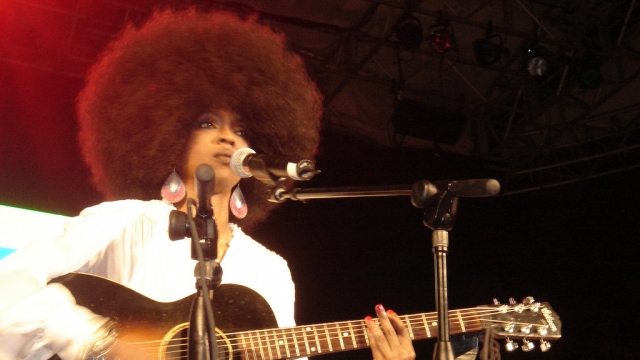
As she does for many folks my age, Lauryn Hill holds a particular piece of real estate in my memory bank. Singular talent of that magnitude comes once a decade. When The Score hit shelves in ‘96 and Lauryn's afro-mixed-with-braids, loop earrings, and lipstick showed the world how to cover an already classic soul number, my Foxy Brown poster came down the wall, immediately replaced.
9:30pm, doors open. Metropolis fills up in less then an hour. Over two thousand people here for one reason alone. No opening acts, just a bunch of instruments on stage and a DJ screaming in the mic, trying to warm up the crowd with a medley of hip hop “bangers.” Not a good look. Couple of hours go by and everybody is getting impatient. A few choruses of “Lauryn, Lauryn, Lauryn” pick up, nothing moves. I see my boy Malik and the first thing coming out of his mouth is “yo, I saw her at Rock The Bells last summer and it sucked.” I'm thinking “whatever, I'm just here to pay respects” but I'm starting to feel bad for the folks that paid a hundred and fifty dollars for their respects.
12:30am, the band hits the stage. A few minutes later, the woman everybody is here to see swaggers to the front, facing a Metropolis in complete ebullition. Beauty and grace are still carried but a mask of pain and disillusion covers her face. She apologizes for the wait, eases into the crowd with a spiritual reggae number – Bob Marley's “Forever Loving Jah” – and follows up with long-winded renditions of “Lost Ones” and “Final Hour.” After these first three songs backed by the band, confusion is rampant. My first impression is the lack of chemistry between her and her musicians, within the musicians themselves, and her unease on stage. I'm bracing myself.
Regardless, the crowd that night was showing her love and she let it in. In one short magical moment, she flipped it on me, on us. I'm not sure what happened, but a light sparked and each song after that kept getting better and better. It started with “Ex-Factor.” She didn't sing it. She lived it. The wails, the cries, the junkie spasms when she sang “you let go, and I let go too” were enough to make a grown man cry. A heartbreak song can only be sung by a broken heart. “When it Hurt So Bad” felt so good. “Zion” didn't have Santana's solo, or anything close to it, but it delivered and kept her at one with the crowd.
Asking “how many Fugees fans are in the house tonight” turned the crowd over and placed it right in her hand. “How Many Mics,” “Fugee-La,” and “Ready Or Not” were consecutively crushed, by her and the band, each including Pras and Wyclef's verses delivered by Lauryn. Live. Hip-hop heads were fed their biscuits.
She walked off the stage like a queen with two thousand admirers. Nobody expected an encore. The band started playing “Turns Your Lights Down Low” in what seemed like an attempt to quietly bring people off their clouds but after the first chorus, Ms. Hill reappeared on stage, mic in hand, singing “turn your lights down low, never never try to resist, oh no…” No one did. “Doo Wop” closed the ceremonies. Every man and woman snapped their fingers at her command, then split the room in half for the chorus just like the song says.